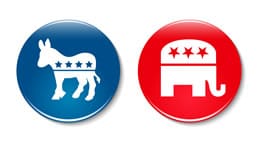Exposing the risks of third party politics


Britain’s Liberal Democrats were distinctly a minority party during this year’s Parliamentary election. But Lib-Dem leader Nick Clegg fired the imagination of dissatisfied and worried citizens, and upset the balance of power between the two major parties – Tory and Labor. No one ended up with a majority of seats in the House of Commons – the UK’s main legislative body. That put Clegg and his minority party in the position of kingmaker. It would take Lib-Dem votes for either Labor or Tories to create a majority and thereby form a government under British law.
Clegg bargained skillfully with both parties and despite the apparent closer ideological relationship between Labor and Lib-Dems, forged a deal with the Tories that anointed Clegg as number two in the British government, and made the Liberal Democrat Party a major player in the United Kingdom’s political landscape.
A similar story exists within our own history. Abraham Lincoln was a Whig (one of the two major parties at the time), but had grown dissatisfied with his party’s failure to take an honorable stand on the issue of slavery. He and a number of colleagues joined a minority party known as the Republicans to take a stand against the largely southern-centered Democrats and their demand for “Slavery now! Slavery tomorrow! Slavery forever!” Lincoln and his fellow Republicans won the day, which resulted in southern secession, the Civil War, the end of slavery, and the substitution of Republicans for Whigs in the American two-party system.
But, not all third-party actions result in such long-term beneficial outcomes.
In Israel, the political makeup of the Knesset (Israeli Parliament) is based on multi-party elections that usually result in coalition governments. Today’s Israeli political landscape includes several religious parties along with two major centrist parties -- Likud (center-right) and Labor (center-left). Despite the fact that most Israelis are secular, multi-party elections put the religious parties in a power position. And the religious parties view political decisions more in Biblical terms then modern pragmatism.
Multi-party, parliamentary coalitions are inherently unstable. Any fissure in the coalition can cause the government to fall, and force new elections far ahead of the required timeframe. Italy is a great example of this instability at work. On the other hand, Britain and Germany have managed the system more successfully.
Many who visit this website consider themselves Independents and seek a Nick Clegg to pull the country out of its polarization, lethargy and seeming downward spiral. But, Independents can only wield true power through coalition building. The value of America’s two-party system is its ability to keep our political process centrist, without violent lurches to the far right or far left, and to keep our government stable and unchanged for set periods of time.
Third parties such as Greens, Natural Law and Libertarians tend toward far left or far right extremes and are not representative of mainstream American thinking. But, what if we had a British-style parliamentary system?
We might well benefit from the formation of new centrist parties such as the Liberal-Democrats in Great Britain, or the Republicans at the time of the American Civil War. But, we might also find ourselves with kingmakers whose positions are far outside of the mainstream. Religious parties, for example, who insist that America is a Christian nation and must follow Biblical principles, or an atheist party that insists the notion of a Supreme Being may never be referenced in any act of the federal government could emerge.
It is important to hear alternative voices – and America’s legacy of free speech allows and insists upon that right. But, when free speech is confused with our electoral system, it could result in chaos, or in the tyranny of minority beliefs. Herein lies the value of a two-party system. It should not exist to muffle other voices, but to ensure that the will of the people, and not the will of an activist minority, determines our direction.
One or both of the current parties may well need to whither away and die – much as the Whigs did in Lincoln’s time. But, I believe that changing the rules to insist on multi-party representation and multi-party elections is not the wise way to make this happen.



